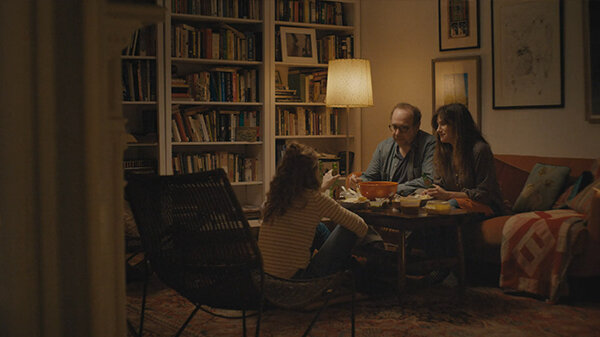Rom-coms come and go, manufactured at breakneck speed and too often with the same DNA. But the romantic drama, despite catering to a very specific demographic, offers a braver, richer space for dialogues on love in all its variations. Through Pink Wall, Only You and Private Life, Nicole Davis looks at how the two-handers mirror our own heartbreaks.
I have an inclination towards romantic dramas that lay all their cards on the table – a beautifully set table, no less – and probe the ins and outs of a central relationship with microscopic intimacy. It’s why I made a beeline for Tom Cullen’s Pink Wall at the 2019 London Film Festival. A non-sequential excavation of where a relationship faltered, the film depicts its central couple, played by Jay Duplass and Tatiana Maslany, at six various stages in their six-year relationship. Alternating rapidly, often within the same scene, between fractious and flirtatious, tender and bitter, their emotional nakedness was cinematic nectar.
Romantic dramas are different to rom-coms, which exist in a world of coincidence and chance. The romantic drama knows bad things will happen to you. Hearts are broken more readily than romantic gestures made, and these films about having the courage to make mistakes more than they are about happy endings. In its own small ways, the romantic drama serves as a corrective to a genre built on falsity.
Tamara Jenkins’ Private Life, the very title of which suggests unfettered marital insight, opens with a shot of Rachel (Kathryn Hahn) lying sidelong in bed. The curvature of her abdomen and thighs, as her husband Richard (Paul Giamatti) whispers “You ready?” suggestively winks about what this might entail. Certainly, he is about to penetrate her. But as he peels down the top of her underwear and counts to three, the viewer quickly learns it’s with a hypodermic needle suffused with hormones. As Rachel lets out a blasphemous reaction to the pain, the moment moves from intimacy – albeit medical – to one of passive aggression and exhausted discontent. “Why did it hurt like that?” Rachel caterwauls. “I’m not a doctor, remember?” comes Richard’s wearied reply. Romance has been usurped by the exertion required not just by the experience of life, but the creation of it.
Likewise, Harry Wootliff’s Only You is quick to establish its world as one in which taxis do not arrive at the first whistle, or stop for you specifically at all. Elena (Laia Costa) and Jake’s (Josh O’Connor) meet-cute happens after they both hail the same cab trying to get home on New Year’s Eve. They exchange small talk after agreeing to share the journey, and smiles are inflated by attraction – but no sooner than Elena has to jump out of the cab to vomit. There may be festive lights in the background, but as Jake recommends Elena sticks her fingers down her throat, pragmatism is favoured over romanticism.
This pragmatism also permeates Jenkins’ script for Private Life – which reading is a delight. It surges with specific detail that feels spawned by experience, rather than assumption, such as:
Rachel’s underpants are the kind you’d find in a twelve-pack: moss green cotton bikinis with lots of little flowers. The elastic waistband is separating in one spot.
It suggests a couple whose life has lost its elasticity and spontaneity; their love is devoid of laciness, but beats on nevertheless. Even in a newer relationship, that resonates with greater realism than when beautiful women swan about palatial apartments post-coitally dressed in their lovers’ crisp white shirts. I think the men I’ve dated have only ever owned plaid.
This sense of favouring realism is cemented further in Only You when Jake plays Elvis Costello’s ‘I Want You’ from Elena’s extensive record collection, having opted to walk her home after taxi-gate. The song is a deranged underscoring of the obsessive, all-consuming nature of loving, of wanting someone. Its intensity forebodes Elena and Jake’s own fate, and again points to the messiness that surely defines most relationships under the microscope. If romantic comedies are a sugary high, romantic dramas are an acid reflux.
In an interview about Private Life, Jenkins declares her interest as being in “what people say to each other when they’re pushed to a kind of primitive state… where you really see what they’re feeling.” In a culture that still fetishes women’s appearance, in which women suffer a gender pay gap of 8.9% and are five times more likely than their male counterparts to experience sexual assault, knowing what women think and feel, seems to me a cultural imperative.
All three films concern themselves with maternal impulse, or lack thereof, and how failing to live up to this feminine ideal can be a cause for shame and sadness. In Pink Wall, Cullen astutely writes Jenna (Maslany) as outspoken, prone to moments of explosive agitation. It makes the character an occasional mouthpiece, but for the most part, her dialogue serves as an insight into a millennial woman’s conflicts. During a scene in which she and Leon (Duplass) discuss the bleak options of parenthood (less than ideal societal circumstances in which to raise a child; adoption being a risky business; stealing one considered no-go territory), we detect Jenna’s ambivalence and apathy to the task of motherhood. “You’re gonna kill it...you’d gonna be a great Mum” encourages Leon. “Yeah...sure. Why?” comes the combative response. It spirals into her illuminating that women are reminded, monthly, through the medium of “two super tampons” of their biological purpose, which if they deny, has to be explained or justified by a wildly successful career. “[Motherhood is] not an innate thing in women….it’s a total misconception”, Jenna continues.
In a reversal of Jenna’s disclosure, there is a painfully funny moment in Private Life in which Rachel explains to a friend that her and Richard are undergoing IVF. Her friend assumes a reference to ‘cycling’ means she’s attending Soul Cycle classes. Hahn acts the scene with a beautiful nervous energy; apologetic and terrified of the judgement she’ll absorb from admitting maternal desire, despite her older age.
The concerns women face are, of course, narrowed when refracted through a romantic drama. These particular characters are a triumvirate of able-bodied, attractive and educated women, who have the security and stability of a heterosexual partnership. This doesn’t immunise them to life’s traumas, nor does it make them unsuitable for public discourse. But let’s be clear that when Tamara Jenkins says she is ‘interested in people’ it is nonetheless a distinct type of person, because those who populate the romantic drama are of a distinct type. White, educated, intellectual, artistic, heterosexual; these are pickle-making, vinyl-playing, cable knitted jumper-wearing individuals who have the privilege of putting their wants first. Life might conspire to deny them, and certainly those wants aren’t shown as easily attainable, but their lives are still somewhat aspirational. This is most clearly signalled through production design. In Pink Wall, Leon lives in a flat teeming with candles, lanterns and soft furnishings. There is art propped up against exposed brick interiors, and the kind of minimalist armchairs that flourished with the influx of Scandinavian design. When Jenna first comes over after they meet at a nightclub, they drink camomile tea from mugs without handles. It’s an aesthetic of cluttered chic shared by Private Life. Richard and Rachel have enviably brimming bookshelves and when their niece Sadie comes to stay, she comments “how Instagrammable” the display of breakfast items is.
Private Life is also heavily referential. “Do you think we should take down the Lisa Yuskavage?” says Richard of a painting in their apartment before their social worker arrives, in reference to the contemporary American artist working at the intersection of pornography and religious iconography. In an interview with Yuskavage, her work is described as “gorgeous and grotesque, frivolous and multilayered, debauched and coy”, and it doesn’t seem far flung to imagine that Jenkins views women the same way. Her characters are nothing if not multilayered. But the reference is niche, and firmly situates Richard and Rachel in an artistically bourgeois milieu. Their problems are universal, but their world is, possibly, alienating.
Only You is a refreshing diversion from the genre’s tendency to give characters creative careers, in that Elena has a job as an arts council worker, whilst Jake is studying for his PhD in marine biology. However, when Jake and Elena start trying for a baby and then undertake IVF, it’s presented as an option that is economically available to them. These films manoeuvre matters of the heart and body with acute sensitivity, showing the bruises and blows that come with being in a relationship. But it doesn’t go unnoticed that these blows are cushioned by economic stability and familial support.
And yet, the inherent emotional turbulence is why I keep returning. If these films are denied dynamism from a relative lack of action or movement, they make up for it with a deft navigation of feelings. Pink Wall devotes a solid ten minutes to a painful argument between Jenna and Leon, against the backdrop of rolling hills and high winds, the pastoral landscape jarring with their blistering accusations and admonishments. Through tears and what feels like the demise of this relationship, Jenna says to Leon “You’re my best friend...I love spending time with you,” a line which is cut from a wincingly similar cloth to my own recent break-up. The film ends with the genesis of that friendship, and seems to suggest that, despite its unseemly end, something beautiful existed here.
The romantic drama does not just say, There will be heartbreak and pain and trauma,” it provides a space to have a dialogue about it. Characters arguing about their frustrations, which fortunately reflective of some of my own, is ultimately about catharsis. Naming is normalising, and the more we see stories that discuss women’s ambitions and ambivalence and desire not to be hemmed in, as well as men’s equal importance to (and anxiety around) matters of infertility, the greater the vocabulary we can gain to talk about it in real life.
Pink Wall opens with an argument between Leon and Jenna. “Love is about calling people out on their shit” yells Jenna. If her modus operandi is “not backing off” as Leon counteracts accusingly, the same could be said of the genre itself.
Nicole Davis (@stonecoledfox) is a freelance writer based in London and the host of Best Girl Grip podcast. She has written for Little White Lies, i-D, Mubi and the BFI.




